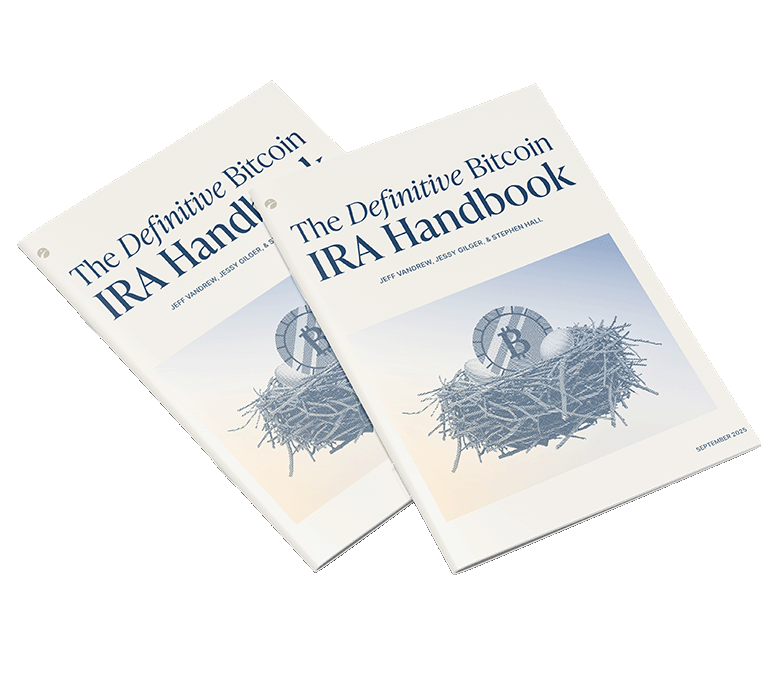
The definitive bitcoin IRA handbook

One of the distinguishing features of bitcoin is that tokens are bearer instruments: you can directly custody your own assets. This freedom to be sovereign over your own wealth and to transact without censorship is, for so many of us, the allure of bitcoin.
But as our ecosystem grows, relying on third party custodians for custody around financial services related to bitcoin swings us back towards the existing status quo: your bitcoin held in a bank checking account (a database) or your ether held by a custodian, on behalf of a broker, on behalf of you.
In our own bitcoin-backed lending industry, a borrower typically has to entrust their assets to a custodian who holds them as collateral on behalf of the lender. Rights to move and spend the collateral become entries in a database, potentially subject to the whims of a single loan officer or DBA.
Instead of imitating the custody models applied to traditional, non-bearer instruments such as securities, companies who provide financial services for cryptocurrency holders should instead leverage the features of bitcoin: strong cryptography, transparency, and accountability. Custody for crypto-financial services should be on-chain and auditable at all times by all parties involved in a transaction.
In 2016, we started Unchained Capital with the knowledge that the safest way to build our business was to rely on multi-signature addresses backed by 100% offline, cold-storage hardware devices. For 18 months since, that infrastructure has protected tens of millions of dollars worth of collateral. Our borrowers tell us our architecture makes them feel safe and they value the transparency of receiving a dedicated, on-chain address for each of their loans.
Most other loan providers instead use third party custody services or exchanges to store collateral. This creates potential threats for borrowers:
The conveniences of a third party custodian come at the cost of long-term risks. These are not necessary given the features offered by the blockchain.
Unchained has always used dedicated, on-chain, multi-sig to safely and transparently secure the bitcoin collateral for each borrower’s loan. To date, a single institution — Unchained Capital — has held all the keys required in cold, offline and hardware wallets.

Today, we’re building on this foundation by releasing a new multi-institution custody model:
This multi-institution 2-of-3 model significantly enhances security for all involved. No one person or organization can threaten the collateral. This provides enhanced controls for several scenarios:
Details of the multi-institution custody model, including real screenshots of Unchained Capital’s application, follow below.
Beginning today, borrowers on the Unchained Capital website can now easily upload a public key from their Ledger or Trezor device:

The (extended) public keys uploaded by borrowers allow Unchained Capital to generate a sequence of multi-sig addresses signable by the borrower, Unchained Capital, and our third party key agent. Private keys remain on the owner’s hardware wallets and are never shared with Unchained Capital or with any third parties.
While applying for a loan, you may choose between two custody models:

Choosing the “multi-institution” option will let you select a key you’ve previously uploaded:

Before launching today, Unchained Capital offered select existing borrowers the chance to evaluate a multi-institution loan. Here is some feedback from one early multi-institution borrower:
“Not your keys, not your Bitcoin…”
One of the most important parts of owning Bitcoin is practicing proper custody and security procedures for the private keys that control it. Putting up your Bitcoin as collateral for a loan shouldn’t mean you have to give up complete custody of it, and now, thanks to Unchained Capital — you don’t have to! With their new multi-institution feature, you can upload your own keys for use in controlling transactions from your loan’s multi-sig escrow address. Unchained Capital has extended their already-excellent loan management system, adding seamless integration with the Trezor [and Ledger] hardware wallets — allowing you to work with a key management system you’re already familiar with.
Thanks Unchained Capital; you’ve made it even easier to use your service, and now I can put my Bitcoin to work for me — without having to surrender my keys!
— Brian Lockhart (@BrianLockhart)
Features that enable uploading keys from your hardware wallet and creating multi-institution loans are now available to all Unchained Capital users.
Sign up today and try it out!
After uploading a key, existing borrowers can contact hello@unchained.com to convert their single-institution loans into multi-institution.